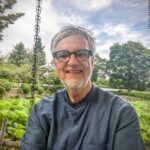〔Visiting Professor Report〕Prof. Ortwin Renn(Research Institute for Sustainability Helmholtz Center Potsdam, Germany)
Updated: 2024/07/24
Fellowship Report: Journey of Transdisciplinary Discovery at Kyoto University
Visiting Professor Ortwin Renn (Research Institute for Sustainability Helmholtz Center Potsdam)
 From April 4 to July 5, 2024, I had the privilege of serving as a visiting professor at the Research Institute for Sustainable Humanosphere (RISH) at Kyoto University. This fellowship was a transformative experience, blending rigorous academic engagement with rich cultural and social impressions. Throughout my stay, I contributed to a variety of lectures, workshops, and field tours, each designed to deepen the understanding of sustainable development and promoting transdisciplinary research.
From April 4 to July 5, 2024, I had the privilege of serving as a visiting professor at the Research Institute for Sustainable Humanosphere (RISH) at Kyoto University. This fellowship was a transformative experience, blending rigorous academic engagement with rich cultural and social impressions. Throughout my stay, I contributed to a variety of lectures, workshops, and field tours, each designed to deepen the understanding of sustainable development and promoting transdisciplinary research.
Lectures and Presentations
My lecture series began on April 11 with a graduate seminar at Kyoto University’s Main Campus. I delved into “Transdisciplinary Research Methodology,” illustrating how this approach transcends traditional social sciences by integrating diverse perspectives to tackle complex global challenges. This seminar set the stage for subsequent workshops and lectures.
On April 17, at the Uji Campus, I led a workshop on the core concepts and methodologies of transdisciplinary research. This session emphasized the importance of collaboration across disciplines to address sustainability issues effectively. A week later, I focused on stakeholder and citizen involvement in transdisciplinary research at another workshop at the Institute for Human Survivability.
May was a particularly vibrant month. On May 7, I participated in the Kyoto Symposium on Sustainable Mobility, presenting on the risks and prospects of sustainable transportation. The symposium highlighted the urgency of developing environmentally friendly mobility solutions. The concept of polycrisis—a constellation of interconnected crises—was a recurring theme in my lectures. On May 16, at the Disaster Prevention Research Institute (DPRI) in Uji, I explored systemic risks and their implications for risk management and public engagement. This topic resonated deeply, leading to further discussions at Kwansei Gakuin University on May 24 and at RISH on May 27, where I examined sustainable development through a transdisciplinary lens. June was marked by workshops and seminars focusing on sustainable development and policymaking. At the Research Institute for Humanity and Nature (RIHN) on June 5, I discussed methods for analyzing and communicating sustainable development initiatives.
Field Tours
Field tours offered an invaluable perspective on Japan’s sustainable development efforts. On May 24, I traveled to Kwansei Gakuin University to present on systemic risks in multiple crises. This was followed by a series of engaging field trips in June.
On June 1, I met with town developers and residents in Chizu, discussing citizen-led capacity building with esteemed colleagues from Kyoto University. This grassroots approach to sustainability was inspiring. The next day, I visited Tottori University, engaging in fruitful dialogues with Professors Hideaki Noda and Kei Fukuyama, and leading a seminar on polycrisis and systemic risks.
Higoshima, Uchiko, Matsuyama, and Takamatsu were also on my itinerary. Each location provided unique insights into local urban planning and sustainability initiatives. Notably, in Uchiko, I engaged with local planners and personalities, exploring community-driven urban development.
Publications
During my fellowship, I completed a significant publication and laid the groundwork for future research. My article, “The Many Faces of Uncertainty,” was published in the Journal of Risk Research. Looking ahead, I am co-editing a special issue on transdisciplinary education and research for the Journal: Innovation – European Journal of Social Sciences. Additionally, I am preparing two concept papers on polycrisis and systemic risks with esteemed colleagues from Kyoto University, slated for completion in the fall of 2024.
Conclusion
My fellowship at Kyoto University was a profound journey of academic growth and cultural exchange. The diverse activities—from lectures and workshops to field tours—enhanced my understanding of sustainable humanosphere and transdisciplinary approaches. The experience underscored the power of transdisciplinary research in addressing the multifaceted challenges of our time. As I reflect on this enriching period, I am filled with gratitude and a renewed commitment to fostering sustainable development through collaborative, interdisciplinary approaches



